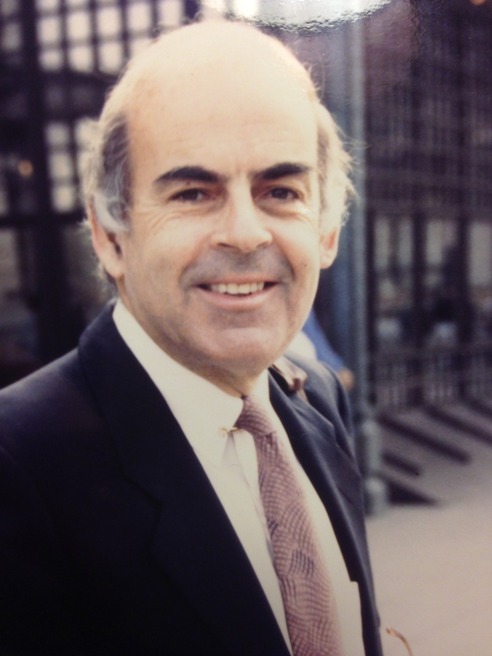A Life Well Lived
Fredric Joseph Van Rheenen, MD, died Wednesday morning, July 20, 2016, at home in Atherton, California, at the age of 78. He leaves behind his wife (Eileen), three daughters (Erin, Jessica and Emily), two sons (Brian and Derek) and two granddaughters (Lauren and Shelby).
His passing is a deeply felt loss for his family and friends. We miss him terribly, and will never forget him.
Rick was born in 1937 in Iowa. He was an only child, but had many beloved cousins. He lost his mother when he was 3 years old, and was raised by his dad (Fred Van Rheenen, who sold insurance for Prudential) and stepmom, Clothilde Bernard (a teacher) from age 5 on. Rick liked to joke that Clo came into the family with a clipboard and a plan for his life, including drama, classical piano, altar boy, Eagle Scout, and most of all, becoming a doctor. He fulfilled all of those expectations and more.
The Boy Scouts were a big part of Rick’s childhood (and the source of many great stories). He was one of the youngest Eagle Scouts in Iowa, getting his Eagle when he was just 14.
As a young boy, he and his parents traveled to many of the country’s national parks–lots of road trips! The family also built a cabin on Woman Lake in Minnesota where Rick and his high school buddies (the oft-mentioned Tom, Todd, and Hank) spent a lot of time.
Rick's love of cars began early. As a 10-year-old, he would sit on the curb in front of his house in Des Moines, watching and admiring every car that went by. He and his friends would quiz each other on every car they saw. Later, even when he was struggling with his memory, he could point out cars from the 40s, 50s and 60s, telling us what year they'd rolled off the assembly line and how their innovations in running boards and fin shapes rocked the automotive world.
After a year at Iowa State, Rick left the Midwest for the Northwest, attending the University of Oregon at Eugene, and then the University of Oregon medical school in Portland. Phi Delta Theta was Rick’s fraternity at both Iowa State and the U of Oregon. He had wonderful memories of the Phi Delts and remembered all the fraternity songs.
He married Kathleen Pogue in 1958 in Portland, Oregon; Brian was born in 1959, Erin in 1960 and Derek in 1964.
Shortly after graduating med school, in 1963, he joined the Public Health Service, becoming a doctor in the Peace Corps and moving his family to Nigeria for two years. Rick was an adventurous soul who loved to read and travel and experience new things, and his family benefited from and absorbed these passions.
After Nigeria it was back to Lake Oswego, Oregon, and two years studying internal medicine, then to the San Francisco Bay Area and a psychiatric residency at Stanford Hospital. During that residency he also earned an MA in Anthropology at Stanford, taking his family in 1968 to Lake Atitlán, Guatemala, so he could work at a medical clinic there and do research for his thesis: a study of alcoholism among the local inhabitants.
Back in the Stanford area, Rick began private practice as well as being a very active adjunct faculty member at Stanford. He was one of very few private practice physicians hired by Stanford, and for more than 20 years was the psychiatric consultant to the Oncology Unit at Stanford Hospital. His internal medicine background made him an even more effective psychiatrist for both the cancer clinic staff and for cancer patients.
Rick met his second wife, Eileen Moran, at the VA Hospital in Palo Alto, and they lived together for 9 years before marrying in 1980. Jessica was born in 1987 and Emily in 1991.
Rick was in private practice for more than 40 years and he absolutely loved what he did. His patients deeply appreciated his wisdom, honesty and irreverent humor.
Rick loved classical music, especially from the Baroque and Classical eras, with Vivaldi a particular favorite. And he had what could only be described as a lifetime love affair with The Eagles! He took classical piano lessons for about 8 years but was most happy about learning to play chords so that he could sight-read popular music.
Besides music, learning about art and architecture was an avocation for many years. Rick audited numerous Stanford courses and liked going to museums and doing architecture tours. For several years he donated an auction item to Peninsula School, which entailed him leading a walking tour of the Stanford campus focused on the architecture and outdoor sculptures. It was wildly popular and got rave reviews.
One of Rick’s most remarkable attributes was his incredible sense of humor. It served him well throughout his life, and he kept everyone around him laughing. He often said that no matter what was going on, “at least I can still make people laugh!”
Honoring his medical background to the end, Rick donated his brain to Stanford University for Alzheimer's research.
If you wish to remember Rick with a donation, please consider the Alzheimer's Association.


